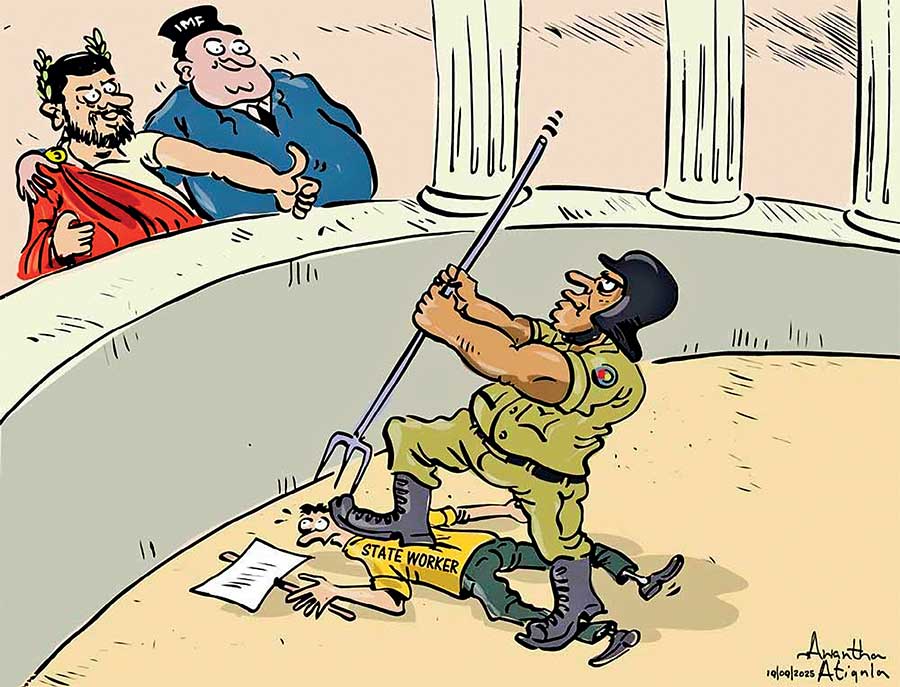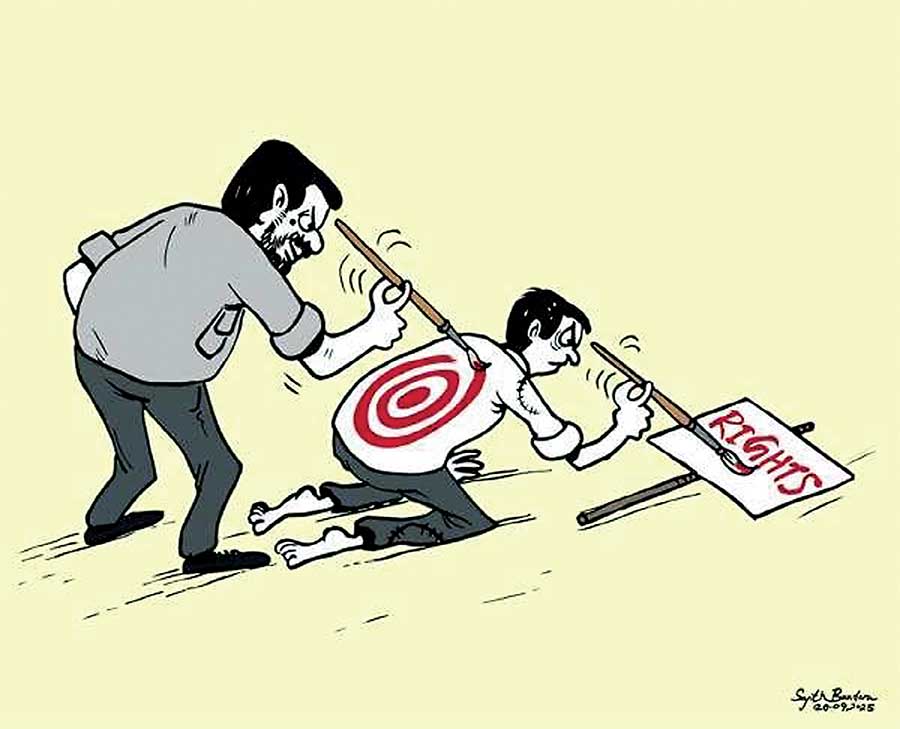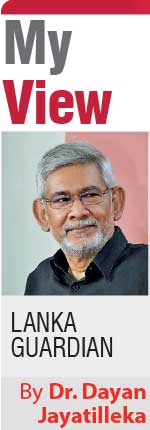Sunday Feb 22, 2026
Sunday Feb 22, 2026
Thursday, 25 September 2025 00:44 - - {{hitsCtrl.values.hits}}

Anura Year I

AKD Year I
 The key thing about the first year of the AKD presidency is that its true character and core content were revealed through action and inaction; roads taken and not taken; choices made and options rejected. The AKD presidency revealed its reality in its first year. It showed its soul.
The key thing about the first year of the AKD presidency is that its true character and core content were revealed through action and inaction; roads taken and not taken; choices made and options rejected. The AKD presidency revealed its reality in its first year. It showed its soul.
President AKD spoke at length about economics at the ceremony to kick-off construction of the Kadawatha-Mirigama segment of the Central Expressway project. This passage is key:
“…Even by today, the IMF, World Bank and rating agencies have given extremely important signals about our economy. I saw a report in which the World Bank has given us the recognition that in rebuilding broken-down states, the fastest speed has been registered by Sri Lanka. This is an extremely important factor. Therefore, we are proceeding on our journey with great steadiness and stability…”
(https://www.youtube.com/watch?v=kFn9HN9X0ss)
TV news showed JVP chief theoretician Bimal Rathnayake leading the cheers as Anura paused, having enunciated this wisdom.
AKD’s self-placement of the Report as a feather in his cap revealed not only his self-image but also his chosen path and actual ideological orientation. Clearly, on economics he stands to the right of the World Bank report and the World Bank itself. An obvious but cheap shot that the World Bank report has been ‘lost in translation’ would provide AKD with an undeserved excuse. The big news about World Bank Report was not that it patted AKD on the back-- which it did, but it was a left-handed pat. The big news was that it surfaced the dreadful downside of an unprecedentedly sharp and speedy fiscal adjustment, i.e., ‘shock therapy’.
Anura made no acknowledgement of that dark downside which clearly appears in the Report, nor announced programs adequate to reverse the situation—still less prioritising them as President Premadasa did Janasaviya. He declared that as affirmed by the World Bank’s accolade and the ratings agencies upgrades, his Government was moving steadily, stably forward and would continue to do so. He was blind to or unimpressed by the structural unsustainability and latent instability sourced in the gaping asymmetries the Report tracked. For Anura, it’s all good.
|
Walking the foreign private creditors’ talk
|
|
Shiran Illanperuma: SL austerity among history’s most severe
|
|
“Anyone can give himself the name of ‘eagle’ without having a single feather on his back.”—Fidel
|
Determinant downside
The mainstream press got the downside Anura didn’t.
“… Sri Lanka’s aggressive Value-Added Tax (VAT) reforms in 2024, a key component of its post-crisis fiscal stabilisation, has single-handedly contributed to a 2.2 percentage point increase in the nation’s poverty rate, the report says.
Sri Lanka’s poverty rate continued to rise for the fourth year in a row, with an estimated 25.9 percent of Sri Lankans living below the poverty line in 2023…
…The findings highlight the severe social cost of the government’s revenue-led fiscal adjustment. Over 75 percent of this adjustment has been derived from indirect taxes that disproportionately burden the poor. Following the 2024 reforms, VAT now consumes 5.3 percent of the pre-fiscal income of households in the poorest decile, compared to just 3.3 percent for those in the richest decile.
… What has happened so far is difficult to justify since VAT reforms have pushed the national poverty level higher. In effect, some people who are unable to bear additional burdens have been compelled to shoulder a disproportionate share of the country’s recovery costs…’
(https://www.dailymirror.lk/print/opinion/Tax-for-poverty-alleviation-or-elevation/172-319854)
Deeper examination came from SOAS postgraduate Shiran Illanperuma, a researcher at Tricontinental: Institute for Social Research and a co-editor of Wenhua Zongheng: A Journal of Contemporary Chinese Thought. His critical exegesis on the World Bank Report is indelibly entitled ‘Sri Lanka’s Austerity is One of the Most Severe in History’.
‘…Sri Lanka has undergone one of the sharpest and fastest episodes of austerity in history, driven by a massive retrenchment in public investment and the suppression of real wages, according to a World Bank report.
On 9 September 2025, the World Bank published a report called Sri Lanka Public Finance Review: Towards a Balanced Fiscal Adjustment. The 109-page report is anchored in the theoretical certainty that austerity was a painful but necessary adjustment following Sri Lanka’s default on its external debts in 2022. Yet even within this paradigm, the report provides a treasure trove of data that serves as a damning indictment of how austerity has suppressed investment, undermined growth, and deepened social distress.
According to the World Bank, across 330 episodes of austerity in 123 countries between 1980 and 2024, Sri Lanka’s ‘fiscal adjustment’ from 2021 to 2024 stands out as being ‘sharper and faster’…
…The human toll of this austerity policy is hard to digest. The report states that more than a quarter of the population has fallen below the poverty line, with another third of the population categorised as vulnerable and living on the brink of poverty. The report acknowledges that a four percent increase in poverty was directly attributable to the fiscal adjustment between mid-2022 and mid-2023. The poor have been disproportionately impacted; the removal of electricity subsidies alone led to a five percent decrease in disposable income for the poorest households.
…Real wages remain fourteen and twenty-four percent lower than pre-crisis levels for the private and public sectors, respectively. The public sector, under a hiring freeze, has borne the brunt of this. The average public sector wage, which was already low, fell from eighty-eight percent of per capita GDP in 2020 to just sixty-two percent in 2023, making government wages the least competitive for highly-skilled workers.
These figures contextualise the exodus of skilled workers, or “brain drain”, that the country has been grappling with. A recent study found that an estimated 1,489 doctors, including specialists, emigrated between 2022 and 2024, causing a financial burden of nearly $41.5 million to the Sri Lankan government and taxpayers. This outflow has placed significant pressure on the healthcare system, resulting in shortages of key specialists, disruption in medical training, and widening disparities in access to healthcare…
(Sri Lanka’s Austerity Is One of the Most Severe in History – GTM Portal)
AKD doesn’t note the rise in poverty or drop in real wages—not only before he took over, but also on his watch. Moreover, he’s unconcerned about why well-educated professionals and skilled workers are running away from Sri Lanka under his presidency.
Unlike liberal commentators and conventional economists, Marxist political economist Shiran Illanperuma ignores the ‘Chinese loans/wasteful projects’ and ‘corruption/privileges’ diversionary discourses, and drills-down to the root-cause of the ills highlighted in the World Bank report (a factor noted in the report itself).
‘…The debt bomb…The single biggest component of public expenditure is interest payments, which accounted for nine percent of GDP in 2023. To quote the report, ‘Sri Lanka’s interest payment expenditures are relatively large, whereas the public sector wage bill, capital expenditures, and spending on health, social protection and education are relatively low’. No amount of internal fiscal adjustment can provide long-term stability without defusing the debt bomb that crowds out social investment. A thoroughgoing restructuring or cancellation is needed.
…Sri Lanka’s example is one among many in the Global South —around fifty-four underdeveloped countries, home to 3.4 billion people, spend most of their tax revenues to pay creditors rather than invest in the wellbeing of their people. In these nations, the claims of the creditor supersede the dignity of human beings…’ (Illanperuma, Sri Lanka’s Austerity Is One of the Most Severe in History – GTM Portal)
NPP ideologue Ramindu Perera concedes that the NPP manifesto promised renegotiation of the debt deal and the preparation of an alternative DSA, but says that upon election Anura decided not to risk rocking the boat by deviating from Ranil’s IMF agreement. (https://groundviews.org/2025/09/16/assessing-npps-political-balance-sheet-one-year-later/)
But Anura doesn’t present this as a reluctant retreat. He assures Parliament that there will be no repayment issues come 2028, entirely overlooking the fact that there already are serious issues (noted in the World Bank report) arising from IMF conditionality and the haemorrhage of resources on vampiric debt repayment.
Anura’s 180-degree pivot from his longstanding, substantive critique of Ranilnomics (through the 2024 election campaign) and his overnight embrace of it, isn’t a conversion to cautious pragmatism. A Realist would not have swung, but stopped at and settled on a Middle Path and Golden Mean.
Choices and interests
Apart from the UNHRC Geneva battle (2009) aimed at a Sri Lankan victory, I’ve engaged in complex, constructive international negotiations aimed at achieving consensus which shifts the dial, moves the needle, as a Vice President of the UNHRC; Chairman ILO; Chairperson of the UN Inter-Governmental Working Group on the Effective Implementation of the Durban Declaration and Programme of Action (DDPA); Coordinator of the Agenda item of ‘General and Comprehensive Nuclear Disarmament’ of the UN Conference on Disarmament; and Coordinator of the Asian Group of UNCTAD.
It is clear to me that newly-elected President Dissanayake had a pretty good hand for renegotiating the IMF agreement and ‘shifting the needle’ while remaining within the program. He could have attended the BRICS Plus summit to secure a backstop in the renegotiation; made the point with the IMF that President Wickremesinghe was not an elected President and lacked the popular mandate to sign the agreement he did; mentioned that the IMF had expressed a willingness to renegotiate, to the Leader of the Opposition; recalled the Aragalaya and emphasised the volatility of the popular mood; invited professors Martin Guzman (former Finance Minister of Argentina) and Jayati Ghosh as advisors/consultants to the Sri Lankan side.
Instead, he picked Duminda Hulangamuwa, chairman of the Ceylon Chamber of Commerce which contains local holders of sovereign bonds, as a key Presidential advisor and negotiator with the foreign private creditors—clearly a conflict of interest.
The litmus test was with the foreign private bondholders. Unlike the IMF deal, there was no agreement formally signed by Ranil Wickremesinghe. Ranil had entered merely an ‘agreement-in-principle’ which Anura was in no way bound by. But he signed it unaltered and expeditiously, and exulted.
The result was highlighted in the Report to the UNHRC by Volker Turk, UN High Commissioner on Human Rights: Sri Lanka had obtained from the private creditors a minimalist ‘haircut’ of under 10%, which was well below UN recommended minimum standards.
In its first year, the Anura presidency and the NPP Government have revealed the interests that they primarily serve, as well as those they do not. These can be ascertained by their practice; their actions and inactions-- J-P Sartre would say, by tracing the choices made. Allowing for the burden of inherited constraint, Sartre nonetheless insisted that what is decisive is “what we make of what is made of us”.
The failure to try its best, or simply try, to secure either a much longer deferral of repayment or a greater haircut from the foreign creditors, and entering instead a deal which obtained a paltry ‘trim’ of less than 10%, indicates that this President and Government do not primarily represent the interests of the country and the citizenry.
The choice of the Chairman of the Ceylon Chamber of Commerce which contains private bondholders, as presidential advisor and negotiator, reveals that AKD and the NPP privilege the interests of the private creditors.
The heavy reliance on indirect taxes with the attendant spike in poverty to unprecedented levels as critically highlighted by the World Bank, reveals that President AKD and the NPP Government do not prioritise the material wellbeing and interests of the 99%.
The failure to shift emphasis to direct taxes starting with the top corporates and the wealthiest 1%, proves that AKD and the NPP prioritise and primarily serve the interests of the ultra-rich.
Anura’s and the JVP-NPP’s isn’t ‘Left Populism’–or Leftism, Social Democracy, or progressivism of any variety.
Disowned by the great tradition
SWRD Bandaranaike’s Government recognised the Cuban revolutionary government of Fidel Castro even before Mao Zedong’s China did. AKD’s JVP-NPP Government wouldn’t have had the guts to do so.
Prime Minister Sirimavo Bandaranaike and Anura Bandaranaike recounted the following dramatic episodes to my father Mervyn de Silva, the veracity of which can be checked with Sunethra Bandaranaike and Chandrika Bandaranaike Kumaratunga.
When the JVP’s April 1971 insurrection erupted, Anura Bandaranaike was touring Cuba as the guest of the Cuban Government. As the news from Colombo broke, Fidel Castro summoned Anura, told him to stay on in Havana as a guest until he felt safe, and emphatically assured him that contrary to the appalling mis-identification of the JVP as ‘Che Guevarist’, the JVP hadn’t the slightest thing in common in any respect whatsoever, with Commander Che Guevara or the Cuban revolution.
This was repeated in China. At a meeting with Prime Minister Sirimavo Bandaranaike at which China extended generous financial support, Premier Zhou Enlai assured her that the JVP’s putschist ultraleft adventurism had nothing in common with the teachings of Chairman Mao and the Communist Party of China, going on to say that he had however detected some traces of Trotskyism, and wryly joking that during the Chinese Revolution, People’s Liberation Army chief, Marshal Zhu De used to be “particularly harsh on Trotskyists…he had his own ways of handling contradictions with them”.
In Year One of his presidency Anura confirmed the unerring moral judgment of Fidel Castro, a titan of our time:
“Anyone can give himself the name of ‘eagle’ without having a single feather on his back. In the same way, there are people who call themselves communists without having a communist hair on their heads.” (Fidel Castro Speaks, eds Martin Kenner and James Petras, 1970, p 145.)
Speaking at the University of Havana, March 13th 1967, Fidel was indicting the Venezuelan Communist leadership. The description fits the JVP leadership.
Fidel Castro befriended JR Jayewardene and Gamini Dissanayake (to whom he praised the Indo-Lanka Accord and Provincial Councils in 1988), but there’s no shred of evidence --not even a photographed momentary encounter-- of having noticed Rohana Wijeweera during his extensive interactions with Left leaders heading delegations to the World Festival of Youth and Students in Havana, 1978.
Classifying AKD-JVP-NPP
Anura Dissanayake and the JVP-NPP cannot grasp that the unprecedentedly sharp, fast fiscal adjustment—austerity which is ‘one of the most severe in history’-- cannot but yield commensurate consequences. It would be a poor Marxist who didn’t understand that dialectics would determine that outcome, but throughout its history the JVP has only been capable of a poor caricature of Marxism-Leninism.
Even when waging high-intensity war, a good Marxist-Leninist is scientific, rational and realist (e.g. Vietnam’s Ho Chi Minh, Cuba’s Castro). A bad Marxist-Leninist is unscientific, irrational and extremist (e.g. Kampuchea’s Khmer Rouge, Peru’s Sendero Luminoso, Sri Lanka’s JVP). One deviation generates another: ultra-leftism swings to the opposite extreme of ultra-rightism.
The JVP-NPP recoiled from opting for Social Democracy even in 2024. It has no universalist compass and didn’t see the need for one, thinking it restrictive. That leaves a witches-brew of crass opportunism, amorality, low cunning, unconscionable dissembling and coercion-inflected absolutism as guiding spirit, ethos. This degenerates into conversion to the extreme right; it doesn’t develop into a moderate, rational, pluralist left. That’s why Anura and the JVP-NPP didn’t adopt a social democratic or progressive path in foreign debt repayment, international policy, the Tamil Question, Israel’s genocidal war (and local encroachments), or anything else.